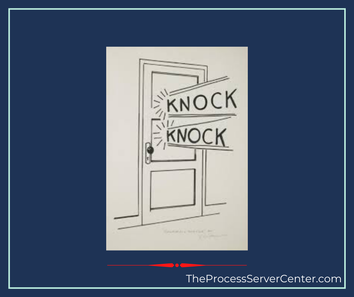|
Author: Richard Farrell, is the driving force behind our mission to help process servers achieve consistent quality in service of process. His extensive experience in training and education development brings a modern approach to finding practical solutions to the process service industry.
There are a lot of factors that can contribute to your process service business’ chances of success, but none are as important as financial management. You may have decided to open a process service business because you have military or law enforcement background, or because you’re great investigating and locating people. Regardless of the reasons you started a process service business, it won’t automatically turn you into an accountant or make you financially savvy. Here are five ways that can help you manage your finances when it comes to starting and running a process service business: 1. Budgeting is Your Best Friend The most important part of any financial plan is a budget. But how do you budget when you have no clue what’s going to come in? One of the easiest places to start is to minimize your expenses as much as you can while building and growing your process service business. A budget shouldn’t be considered a plan for where to spend every dollar, but rather the framework to help you make rational decisions about how your money is going to be spent. Create categories that include office rent (if renting an office), transportation, office supplies, memberships in process server organizations, like PROServer Center, process service management software and marketing, and then come up with ways to reduce costs in each category as much as possible. Once you’ve done that, figure out how much you’ll need to make to cover those costs and still have money left over to save or invest back into your process serving business. This should be your goal for profitability. Holly Black, a process server in Minnesota, has spent her time as an entrepreneur learning how to manage her finances after deciding to pursue a career in process service. She has found that a budget should be used as a guide, allowing yourself the flexibility to make adjustments when and where necessary as you go along. “But,” she says, “never abandon the budget. Always know what’s coming in versus what’s going out. Make sure your essential overheads are covered, or that they can be covered by an emergency fund if there’s a revenue dip.” That bring us to our next tip:
2. Maintain an Emergency Fund
What do you do if (or more likely, when) your process service business goes through a slow period and you can’t turn a profit? Or, if your worst nightmare comes true and your business isn’t successful and you can't attract enough legal professional clients? These are scary thoughts, but the reality is they’re very common scenarios for a lot of small business owners who can’t ensure a steady or consistent income. This is perhaps one of the most common concerns process servers share. An emergency fund can help you get yourself out of a tough situation. Once you’ve figured out how much money you’ll need to cover your process service business and personal expenses for one month, multiply that by six, and make sure you always have that much in your emergency fund. During slower months, or when you come across unplanned expenses, you may need to draw upon your emergency fund. That’s fine, (that’s what it’s there for!) but make sure you’re always replenishing those funds to protect yourself against future unforeseen costs or circumstances. Izabela Szydlo, a process server in Florida, has been running her process serving and courier business for over five years, and has maintained an emergency fund regardless of how the business was doing financially. “I always ensure that I have a certain amount [of money] in the bank that makes me feel safe should things slow down. When I was still in school, a professor told me that if I wanted to freelance, I should get myself a good line of credit as a safety net. I have one of those too, just in case. Obviously, the goal is to never have to use it.”
3. Hire Professionals When You Need Them
Chances are, if you’re reading this list you’re probably not an accountant. While it’s common for process servers to try and handle everything on their own (especially when trying to minimize costs), attempting to manage your own books or file your own taxes could actually end up costing you far more in the end. Spending money on a professional will often help you save money (and will always help you save the headache). Accountants will not only find you more deductions and tax savings, but will also ensure you remain penalty-free and don’t get yourself into trouble inadvertently. Tara Gosling opened her process serving business over five years ago. Although she is confident in her skills as a process server and investigator, she has never been confident with her bookkeeping. “The hardest part for me has always been staying organized with my bookkeeping, and it’s something I still struggle with now. It makes a huge difference and relieves a lot of stress, especially come tax time, to have everything written down clearly. If taxes, bookkeeping, or numbers are not your strong points, pay a professional to help you! I wish I had done that my first year.”
4. Set Money Aside for Taxes
Getting your ducks in a row for tax season can be challenging, frustrating, and a few other adjectives we’d rather not spell out. Something as minor as a lost bill or receipt can have a damaging effect on your tax filing process and may even get you into big trouble. Nobody likes paying taxes but the reality is, none of us can avoid it. The government isn’t forgiving; when you owe, you owe, and you don’t want to be blindsided by an expense you didn’t expect or see coming. Your rates will be different depending on your location, but the general rule of thumb is to set aside at least thirty-five percent of your income for taxes. “Don’t neglect your taxes. I can’t stress that enough. It’s tempting to think, ‘I’ll just write off a bunch of expenses and that will cover it.’ Sometimes it won’t, and you should definitely be putting money aside for [your taxes],” says Izabela. Holly agrees. “Do your taxes as early as possible, that way there will be no nasty surprises and you can forecast how much extra income you may need to cover when the payment is due.”
5. Make Sure You’re Getting Paid
There’s nothing that feels as good as knowing you’ve made a client happy with your services. Except of course, knowing that they paid their invoice for said services on time. When you’re running your own process service business, client payments are your lifeline. If your invoices don’t get paid, your bills don’t get paid, and if your bills don’t get paid, your business can’t run. One of the most important things you can do as a process server is to have a clear and defined payment policy in place. Your clients should know what payments are due, when they’re due, how they can be paid, and what happens if payments are late or missed. You can’t force anyone to make a payment, but what you can do is:
Ancil Payne, who runs a process service business in Texas, helps us understand why getting your clients to pay on time is so important. “The hardest part financially of running your own process serving business is the unpredictability of client payments. In the beginning, when clients aren’t paying on time, you find yourself paying out everyone else, leaving you with just enough to keep your doors open. [When clients pay you late] you may find yourself incurring debts because you’re paying your own loans or bills late.” Running a process service business isn’t easy; that’s why not everyone can do it. Successful entrepreneurship requires focus, dedication, and passion, and of course, a few ways to deal with the ups and downs of your cash flow. We’ve tried to help with the latter so you can spend more time focusing on the former.
Author: Richard Farrell, is the driving force behind our mission to help process servers achieve consistent quality in service of process. His extensive experience in training and education development brings a modern approach to finding practical solutions to the process service industry.
According to a U.S. bank study, more than eight out of 10 new businesses fail because of poor cash-flow management. Don’t let your new business fall prey to that likelihood. From bookkeeping strategies to financing options, here’s what you need to know to set your process service business up for success. Understand Cash Flows. Cash flow is the lifeblood of any business, including process serving. In essence, cash flow is any money coming in or going out of your business’s hands during a certain time period. Money coming in is known as positive cash flow; money going out, negative cash flow. Obviously, the goal of any process serving business is to have more positive than negative cash flow. For many process servers who are just getting started, the early stages of operation may be defined by lots of negative cash flow, as you make investments in equipment, inventory or marketing all the while trying to build your customer base. The risk in not understanding your cash flow — and, consequently, why so many new businesses fail — is running into a situation where you have more money going out, whether to pay rent, utilities, other process servers or so on, than you have coming in, on hand or access to by other means, such as via bank overdraft protection or a short-term small business loan. Particularly for businesses that experience a lot of seasonality, and process serving definitely has its ups and downs in volume, understanding how your cash flow varies throughout the year will help your process service business make the most of the strong-sales months and better able to weather the weak-sales periods. Just another reason you’ll stand to benefit from meticulous bookkeeping. Keep the Books. Getting a firm grasp on all aspects of your process serving business’ cash flow is critical to its ongoing success for a myriad of reasons, and you should establish an airtight method for logging money coming in versus money going out. Having your process service business key numbers at your fingertips will be helpful for all manner of business matters, including keeping track of unpaid payments, scheduling expenditures, cutting wasteful spending, identifying your most profitable services or routes, helping secure investments or business loans, and many other important tasks. Keeping the books, or accounting, is simply the process of recording all the financial transactions pertaining to your process serving business, and you’ll need to decide whether you’re up to the task or would benefit from a professional’s assistance. The number one problem shared among entrepreneurs today is finding, vetting, hiring, and retaining expertise. For many small- to mid-size process serving companies, a cloud-based accounting service like QuickBooks is a cost-effective service that makes bookkeeping easy. As your process service business grows, you may want to consult with a certified accountant in addition to using a cloud-based accounting service. QuickBooks’ software allows you to track your process serving business' sales, invoices, bill payments, employees’ wages, other process server payments, loan repayments and so much more. And, because they’re part of the Intuit suite of software products, you can easily roll relevant numbers over to another one of their products, TurboTax, come tax time. But QuickBooks isn’t the only option, and other bookkeeping software services may be a better fit for your process serving business. Some of other options include:
Don’t Forget about Taxes. Does using an accounting software service eliminate the need for a professional accountant for your process serving business? Definitely not, especially if you have a unique or complex tax situation. While your accounting software may integrate nicely with tax-prep software and having all your process serving business figures documented and in one place will surely expedite preparing your taxes, tax codes change frequently and only a certified CPA can advise you on the most advantageous filing. Plus, going through a CPA limits your liability. Speaking of taxes, what kind of taxes should you be prepared to pay as a process server? As a small process serving business owner, your business is likely categorized as a Sole Proprietorship, Partnership (Limited and Limited Liability), Limited Liability Corporation (LLC) or S-Corporation. All of those categories are considered “pass-through entities” for federal tax purposes and must pay an income tax for the owner’s personal income tax rate. If you’re expecting to owe more than $1,000 in income tax in a year, then you should pay these as estimated taxes according to the IRS’s timetable in order to avoid penalties and interest. Additionally, if you have employees, you’ll be responsible for employment taxes, which includes Social Security and Medicare taxes, Federal Unemployment Tax (FUTA), and their income tax. While technically that last one is paid by employees and withheld from their wages, you’re the one who needs to see that it gets to the U.S. government. Know Your Financing Options as a Last Resort. At some point you may need to inject outside cash into your process serving business, whether to cover a short-term cash flow problem or to invest for future growth. We advise you do that only as a last resort! At that point, it’s good to know the range of financing options available. Here are the most common types of financing for small businesses including process service:
Taking charge of your process serving business’ finances shouldn’t be a headache, and it should be about a whole lot more than just keeping the lights on. With the financial data at your fingertips, you should feel empowered to make strategic decisions for long-term business success. Hire Expert Process Servers Exactly When You Need Them! Source: Entrepreneur
Author: Richard Farrell, program administrator with extensive experience in training and education development at the PROServer CENTER, a legal professional organization whose mission is to set a national standard for the process service industry in the United States.
In a rapidly changing environment, law firms have had to adapt the way they work and run their firms. They had to make changes from the way they interact with their clients to the way they collaborate with their team members and vendors, including process servers. Legal professionals are facing not only practical challenges, such as moving to a remote work environment, but also a necessary shift in mindset to adapt to what is going to be a different world. Overcoming these challenges takes even more time and effort, and having smooth processes and reliable vendors has become a must. More than ever, paralegals want to save time and resources and be able to quickly find process servers who have the skills and potential to take charge and eliminate hassles in process serving. With remote work continuing into 2021, process servers need to be more self-sufficient and proactive about the quality of services they provide and the way they manage their businesses. Here are five tips to help you be the BEST in your role as a process server or the CEO of your process service agency: Take Initiative No one tells a CEO what to do every day. If you want to grow your process service business (or your role as a process server employee), you need to take initiative. Ask yourself what you can do that is above and beyond what an attorney, a paralegal or your boss has asked you to do. If you think something could be done in a better way, make a suggestion for how to improve it. If you see something that needs to be done, start doing it. Take the initiative to research an address before you make your first attempt. When you are trying to serve a respondent, don't just knock on the door, but take the time to talk to neighbors, check names on mailboxes or do a skip trace. These are not only great ways to learn and get better at what you do as a process server, but you will also demonstrate that you are ambitious and willing to take on more. Be a Team Player In our experience CEOs of process serving agencies often act as a bulldozer. If someone does not do something the way they want it done, they just do it themselves. But there is a limit to what any boss can get done on their own. What usually happens is that you start to burn out or you miss important serve by dates or don't notice the mistakes your process servers make. The more that happens, the more your legal clients become frustrated and the faster the quality of your process service falls. If you want to scale your work and have a bigger impact, you have to learn to work with a team. Collaborate with your process servers and trust other people to help you get the job done. Especially early on in your career as a process server agency boss, when you may not have direct reports, you need to learn to lead through influence. Build relationships with the people you work with to establish trust. Ask for Help A good leader has confidence but is also humble enough to know that they don’t have all the answers. Tapping into the expertise of others around you will help you learn and grow. Build a strong network of process servers, attorneys and paralegals you can reach out to in areas where you have less expertise. Make learning a priority so you have a good set of process serving resources to reference. Show your clients that you have thought through some potential solutions before going to them with a problem, but don’t spend too long spinning your wheels before reaching out for help. It’s okay not to know all of the answers, even if you are the CEO of a process serving agency. Your Ears are Your Best Tool I learned an important leadership skill from my father who taught me to “keep my eyes and ears open and my mouth shut until I had enough information to make an informed decision.” A good leader has enough emotional intelligence to know when to speak and when to listen. If you are working as a process server or run your process serving agency, you have to listen to what your client needs before you offer them your service or expertise. If you make decisions before you have enough information, you might make mistakes that could have been avoided. You don’t need to be the first person to speak every time an attorney calls you to retain your services. Ask questions and listen before you weigh in. This is a great way to learn and it will help you earn the respect and trust of your team and your clients. Be Willing to Take Risks No one gets anywhere in life by staying small. You have to take risks and be willing to fail if you want to grow and make an impact as a process server. However, make sure you do your homework and have data to back you up before you try out a new idea. It’s good to take risks, but they should be smart well-informed risks. Part of being the CEO of your process service business is being willing to take responsibility if your ideas don’t work out. No matter how well prepared you are and how well you execute, you still might fail. And that’s okay. We often learn more from our failures than our successes. Take the time to learn from your failures but don’t shy away from risks. Do not be afraid to take charge as you are growing in your process service career. If you want to develop leadership skills, you have to be willing to grab the reins. You don’t need to know all of the answers to lead. If you are asking for help, listening, and making informed decisions, you will have a solid base to grow and learn from as you continue to build your process serving business. The best way to learn is through experience. Each new experience teaches you what works well and what doesn’t and helps you create a management style that works for you. If you have any questions about better managing your process service business, our PROServer Center team is here to help.
Author: Brani Andreev, MBA, is an expert in nationwide management of process service, consultant, speaker, and developer of the breakthrough Management Model of the 4Ps™ that ensures the consistent quality of process service.
Is it possible to start a process service business with no money? It is not easy, but for certain type of businesses like process service, the answer is yes, and here is how it is done.
Process service is one of these service businesses where in most cases, you spend money only when you make money. What it means is that if you have organized your business frugally (you have not rented an outside office and have not hired an office assistant before you have even served one process), then you spend money only when a client hires you to deliver legal documents. The "secret" to launching your process service business with little or no money is to get creative and be determined. Contrary to the cliché, it does not always "take money to make money." There are plenty of process service business owners who started their businesses with little or no cash. Here are 11 strategies that work to start a process service business without capital: 1. Recognize and Use the Assets You Have as a Process Server If you are reading this article, chances are you have little or no cash to invest in a business. But you do have assets and abilities that you can use to get a process service business started. Most likely you already have skills and knowledge that would help you launch your process service business. Perhaps you are a retired law enforcement officer, a former military, have worked as a courier or even a delivery guy. Many skills you have developed while working other jobs could be applied and used as assets when starting your process service business. Using those skills and assets - in other words, using what you already have – is the key to getting your process service business started when you have little or no money. Begin by making a list of things you already know how to do, are good at doing and like doing that are related to process service. Do not limit this initial list. List even the simplest tasks like delivering pizza or mail, as well as more difficult or skilled things like analyzing financial data or creating software. Next, think about the physical things and money you do have that could be used in your process service business. For instance, if you are reading this page on a computer or a mobile device that you own, you already have a piece of equipment that you can use to get your process service business started. You can use your word processor (or other software if you have it) to keep track of your services or prepare affidavits of service or even write up promotional materials and distribute them by email to paralegals or attorneys who want information about your services. If you have an inkjet or laser printer, you can print some of your initial promotional materials in very small quantities. Once you know what works and want to print, say 100 copies, it may be cheaper to have a local UPS or Staples or an online printer run them off for you. Your smartphone can be used to create snapshots or videos to publicize your process service business to people you know on Instagram or other social media platforms. And if you own a reliable vehicle, then you already have one of the most important physical assets to launch your process service business, particularly if you do not live in a metropolitan area with regular and reliable public transportation. 2. Make Money by Saving Time While Launching Your Process Service Startup To increase your chances of success with your business, consider getting proper process server training through online or in-person programs. Your investment in such programs ensures that you have the right skills and knowledge to serve legal documents in the most efficient way and cut time spent per service. Why do things the hard way, particularly if you have little or no money to invest in your process service business? Wasting time while attempting to serve a respondent or getting affidavits ready translates into wasting money. The better equipped you are, the more efficient you become and the more money you will make as a process server. Learning and acquiring process service know-how teaches you to pay attention and minimize spending. It also helps you keep business costs down once you get your process service business going. 3. Work as a Process Server from Home Many process servers complain that they are struggling to make ends meet, even though they have clients and they regularly serve legal documents. While the reasons behind this could be many, one key expense may be pulling you down and preventing you from seeing that profit. Renting office or retail space for your process service business is expensive and most times unnecessary. It is something you may want or need to do once you grow the business in the future and have solid savings in your business account. But when you are just starting out as a process server, find a way to work from home. If you work from home as a process server, your business will not need money for rent, utilities, and office furniture. 4. Conserve Your Cash as a Process Server Yes, a faster computer might be nice. Or a new desk, a better camera, an expensive software package or cloud service. But make do with what you have and look for the lowest cost options for anything you need to acquire until you start bringing in paying customers for your process service business. Conserve cash by organizing your day better and being more efficient when setting your routine. Most legal documents need service attempts during the day if the address given is a business, or early in the morning or later in the evening if the address is a residence. In addition to making attempts to deliver the documents, process servers also need to dedicate time to prepare affidavits, to update their clients on the status of the services, to market themselves and in general, to run their business. Many process servers start making attempts early in the morning and work on their office work in the evenings. Such repetitive routine leads to deadlines being missed, affidavits and invoices being delayed, and ultimately leads to poor business outcomes. Instead, consider alternating your daily routine, where you work on your office and business duties in the morning, then begin attempts toward service at noon. Follow that with attempts early in the morning and office work in the afternoon the next day. Alternating your daily routine increases your due diligence toward service, maximizes your chances to catch a respondent home while it ensures that your office, marketing and business duties will not be neglected. 5. Use Free and Low-Cost Marketing Techniques There are dozens of free and low-cost ways to market your process service business. Learn them and implement them before you start spending money on paid advertising via Google or any other search engines. Using free promotional strategies at first will help you gauge your marketing goals better, and it will help you start to understand what attracts or what motivates your customers to try your process services. Consider joining state and nationwide process service organizations and directories like PROServer list where competition for your local area is low due to its exclusivity which allows only three process servers to be included in each county served. 6. Do All the Process Service Work Yourself at First Rely on your own sweat equity to start a process service business with no money. Expect long days and the need to learn how to do things you have not done before, such as marketing, selling, accounting or even building a website. You can learn how to do some of these tasks for free by searching the web or YouTube for “How to…” followed by the skill you need help with. Consider serving all legal documents yourself and hold off on hiring another process server until you have a good amount saved in your business account. Doing all these tasks yourself at first saves you money and will also help you understand what type of skills each activity requires when the business is making enough profit to hire office or process service help. LET US HELP YOU START A SUCCESSFUL PROCESS SERVICE BUSINESS! 7. Start Simple Your dream might include a pretty big process service business offering a wide variety of products and services and serving large-volume accounts, but for now, keep it simple. Focus on serving process and take excellent care of each and every client who trusts you with their legal documents. Build your customer base and later branch out into other products and services. One of the most expensive parts of running a process service business is acquiring customers. If you gain their trust with one service now, selling another one or attracting a new customer will become much easy. 8. Work for Somebody Else Although they may not admit it, most process service business owners became entrepreneurs thinking they knew more than what they did. In fact, many process servers fail because the person was ill-equipped to build a successful business. Before you start your own process service business, make sure to complete what we call the 2 Factor Success Tools: know-how and field training. Know-how training builds your skills and knowledge necessary to build an efficient and successful process service business. Field training involves practical training of your know-how skills while attempting to serve legal documents. Working for someone else allows you to practice your process service skills while continuing to learn from other process servers' past experience. As a process server working for an agency, you will also gain insider knowledge of the industry that is valuable to the success of your own process service business. 9. Use Free Services The Internet is full of high quality services you can use for free while launching and growing your process service business. Mailchimp is a powerful e-mail marketing platform that is free for the first 2,000 e-mail addresses. Wufoo allows you to make online forms, and although Facebook and other social media platforms will not put your ad in front of large amounts of people unless you pay, you can still gain some traction by telling people about your process service business or by joining Facebook groups and communities. There are also freelance platforms like Fiverr, Elance, and Upwork that have quality freelancers willing to help with logo and web design, and another service for cheap. You could get a logo made for $5! 10. Hustle! Finally, go into your process service business endeavor with a hustling mindset. Be ready to do anything legal and ethical to get your business off the ground. Do not like cold calling? Do it anyway! Not a graphic designer? You can find templates online for just about anything. Do not want to do any free work? It might be worth it to get your name out there. If you do not have the money to pay for services, you have to do them yourself or find somebody who can and will do it for free. Do not let a lack of funds discourage you from starting your process service business. You may have to work harder than someone with more financial resources, and it may take longer. But resourcefulness, creativity, hustle, and determination are often better predictors of success than money! STARTING A PROCESS SERVICE BUSINESS CAN BE OVERWHELMING. LET US HELP YOU!
This online programs includes a FREE Business Startup Checklist
Author: Brani Andreev, MBA, is an expert in nationwide management of process service, consultant, speaker, and developer of the breakthrough Management Model of the 4Ps™ that ensures the consistent quality of process service.
Can a perfectly executed service of legal documents, known as process, go wrong?
Mary, a paralegal from ABC Law firm in Texas, retained John, a process server in the state of New York, to serve a set of legal documents on a defendant (all names in this story are fictitious). When Mary first approached John about process service, she called him on the phone number listed and asked him how much he charged for a routine service in his local area. John provided the information, and Mary emailed him the legal documents with the name and address of the defendant to be served. John diligently recorded the information about the service and began making attempts. Before long, the process server was able to catch the son of the defendant at the given residential address and completed the service as a service on a suitable age person. John duly prepared the affidavit of service and sent it back to the paralegal. When Mary saw the end result, she was very unhappy. The legal documents were not correctly served.
So what really went wrong with this perfectly executed service of process?
The legal documents in this case were filed in the state of Texas. As such, the originating court rules apply and the method of service under Texas law requires a personal only service on the defendant. John closely followed the rules of the state of New York which allow service on a suitable age person in addition to personally serving the defendant. Both Mary and John neglected to communicate about the specifics of the documents and the allowed methods of service based on the originating court and the type of documents served. Mary had to ask John to make attempts toward personally serving the defendant again. The defendant avoided service, and John had to prepare an affidavit of attempted service showing all attempts made to personally serve the defendant. Mary obtained a court order to serve the documents by a substitute service and John had to attempt yet again in order to serve the same legal documents. A simple service of process became long and costly. Both Mary and John felt frustrated.
What happened with John and Mary is not an isolated incident. Just because process service is simple, it does not mean it is easy... A nationwide survey, conducted by the Process Server Center, shows that more than 87% of process servers struggle to retain their clients in the long-run, while 89% of legal professionals are ready to change their process server.
Among legal professionals, process service is often associated with headaches! What usually happens is that either you or your legal team spend valuable time chasing process servers to check on the status of legal documents being served or to obtain a completed affidavit on time for a court hearing. Even when filed with the court, a defendant may still appear and challenge the sufficiency of the service or the veracity of the return. Your headaches from improper service of process are mounting and your legal team spends valuable resources to ensure compliance and due diligence. Among process servers, service of process is also associated with frustrations! Most of the time clients provide very scarce information when contacting a process server for a new job. The information a client usually seeks is how much a process server would charge for serving legal documents in his/her area. Hardly any further details are provided, such as originating court, type of legal documents, methods of service allowed by the court. It is rare that a client would offer any other information pertaining to the person to be served, such as when he/she is usually home; does he work?; how is the address verified? Lack of information provided by the client and lack of details oftentimes lead to incorrect service of process or unnecessary attempts without proper due diligence, similar to what happened with Mary and John.
How can paralegals, legal professionals and process service managers ensure proper service of process?
Every successful process service must start with thorough information gathering prior to making attempts to deliver the legal documents. In order to ensure correct and timely process service and avoid unnecessary delays, expenses and frustration, paralegals and process servers must communicate the information necessary for the successful completion of every process service.
In our example here, Mary should have provided John with clear instructions on how the legal documents should have been served. If Mary failed to do that, John should have asked her about the permissible methods of service prior to making any attempts to serve the legal documents on the son of the defendant.
Paralegals, legal professionals and any client sending legal documents to a process server must:
Next time Mary has a legal document she needs served, she will provide the following information to the process server: * name and address of the person being served * methods of service allowed by the originating court * legal deadlines as prescribed by the court to deliver the legal documents * additional information about the defendant, if known: does the person live alone? is he/she working? when is he/she usually home?
At the same time it is the process server's responsibility to gather as much information as possible about a service prior to beginning his/her attempts. When accepting legal documents from a client, a process server must:
To help paralegals and process servers, like Mary and John, the Process Server Center has developed the Process Server Questionnaire, offered as part of the process service Toolbox. It is a fillable form that can be used every time a paralegal sends out service of process. It contains all the necessary information a process server must have before making attempts. Using the fillable Process Server Questionnaire paralegals and legal professional can:
Author: Brani Andreev, MBA, is an expert in nationwide management of process service, consultant, speaker, and developer of the breakthrough Management Model of the 4Ps™ that ensures the consistent quality of process service.
Rarely anyone hears about process servers in the media unless there is a problem... Media covers topics that range from "a process server got shot in..." to changes in legislation due to improper service of process. Then there are the articles that mention "sewer" service and the implications on people affected by "bad" process servers. So how do we change that? How do we speak up for the thousands of great process servers who perform their duties and diligently serve the legal documents to help people exercise their Constitutional right to be heard and to defend themselves? Two articles from DCist this week are particularly disturbing to all professional process servers as the word "sewer service" popped up quite a few times in them. The first article "Thousands of D.C. renters are evicted every year. Do they all know to show up to court?" describes a months-long investigative project that turned up more than 600 cases in just two months where two process servers filed affidavits containing discrepancies. The result was that tenants were not properly notified of their court hearing dates and had little time to properly defend themselves. The article further addresses the fact that there is no mechanism in place in D.C. to check whether process servers are truthful in their affidavits and have accurately delivered the summonses. The second article "D.C. Council strengthens requirements for notice of eviction cases" follows up on the actions taken by D.C. Council to remedy the situation with sewer service and unanimously approve a new measure requiring landlords to provide photographic evidence that tenants have been given proper notice of evictions filed against them. This article further points out that this amendment came in response to the lengthy investigation as described in the first article. The Council is also planning on moving forward with additional legislation and a broader permanent measure in order to reconsider how to regulate the process service industry. Emergency Legislation Does Not Help Process Servers It is not a surprise that legislators move in to address issues whenever they arise as is the case in D.C. after the months-long investigation that uncovered wrongful tenants evictions due to sewer service. If self-regulation is not possible in the industry, then government as in this case has to act and fill in the gaps with what looks like an emergency legislation or legislation that arises from improper service of process. Such legislation is usually not beneficial to most process servers and does not provide a meaningful method in incentivizing process servers who diligently perform their duties. Sewer Service Media Coverage Does Not Improve Process Servers Reputation In addition to the emergency legislation that often comes out following media coverage of sewer process service, the effect on the reputation of all process servers is at stake. Both articles mentioned above make general statements that tend to imply that the process service industry is riddled by sewer service. The articles also lead us to believe that if it is not for the efforts of legislators, process servers will continue to fake service and provide false affidavits of service to the courts. None of the two articles emphasize on the fact that the sewer services that led to problems with tenants evictions in D.C. were the product of just two process servers.
Sewer Process Servers in NAPPS?
Prompted by a hint from a process server, the Process Server Center completed an independent research and confirmed that at least one of the process servers mentioned in these two articles is a current member "proudly" shown and marketed on the website of the National Association of Professional Process Servers (NAPPS). This fact itself is very troublesome as it further fuels the assumptions made by the two articles. It further leads us to believe that it is entirely possible that there are many other "sewer" process servers proudly marketing themselves as professional process servers on national process servers platforms. Self-regulation of the Process Service Industry is Necessary The two articles in DCist oblige us to react and stand up for all process servers in the United States who are professional and diligent, honest and hard-working. At the Process Server Center we are very disturbed by the findings described in the two articles and we strongly believe that all tenants will be properly notified of a pending case against them if they were being served by one of the many professional process servers in the country. Why legislation to correct improper service of process always targets process servers? Are law firms, paralegals and clients, in general, not responsible for selecting, hiring and managing these same process servers? At the Process Server Center we believe that the process service industry needs to advance nationally as an industry. We believe that self-regulation is the best approach in regulating not only process servers but also process service managers, lawyers, paralegals and legal assistants who manage, instruct and oversee process servers. We aim to change the way clients select process servers and offer a practical solution to find process servers based on their qualities and prior service record. We believe that self-regulation is always better than emergency regulation and we offer a progressive approach to limit the ease of entry to the process server profession, and award the truly professional process servers with the reputation and increased fees they deserve. Perhaps the time will come soon when media coverage would also tell us the story of the many great professional process servers throughout the country and we will be proud to read about them! FIND OUT HOW WE HELP ADVANCE PROCESS SERVICE
Author: The Process Server Center | PROServerCENTER is a legal professional organization whose mission is to set a national standard for the process service industry in the United States.

Most people turn to the internet when they need a product or a service. Government agencies and law firms are no exception when trying to find the best, most professional and reliable process server. They search the local area for any business listings or tap into online directories like NAPPS, Serve-Now or the Process Server Center. The task to find a process server who you trust to do the work can be daunting, and most times it may lead to a few times of trial and error in order to find the most professional process server. Whether you are a government agency seeking to deliver support collection documents or a law firm having to serve a number of subpoenas in several states or a pro se client with a family law case, how do you find a reliable process server? What are some of the qualities to look for when you are trying to choose a process server? Is there a way to find the best process server in any zip code without the trial and error?
Next time you need to find a process server, eliminate the hassle of finding the best professional process server by joining PROServerLIST - the Exclusive Directory of Pre-Screened and Certified Process Servers at the Process Server Center.
|
|
|
PROServerLIST helps clients hire the Best Process Servers - Pre-Screened and Certified |
|
THE PROCESS SERVER CENTER | PROServerCENTER |
✆ 917-409-7046
|
FOLLOW US
|
|
|
|
|
Copyright © 2017 - 2020 The PROCESS SERVER CENTER | All Rights Reserved








 RSS Feed
RSS Feed
